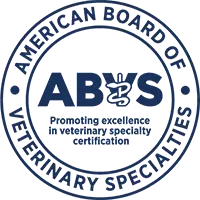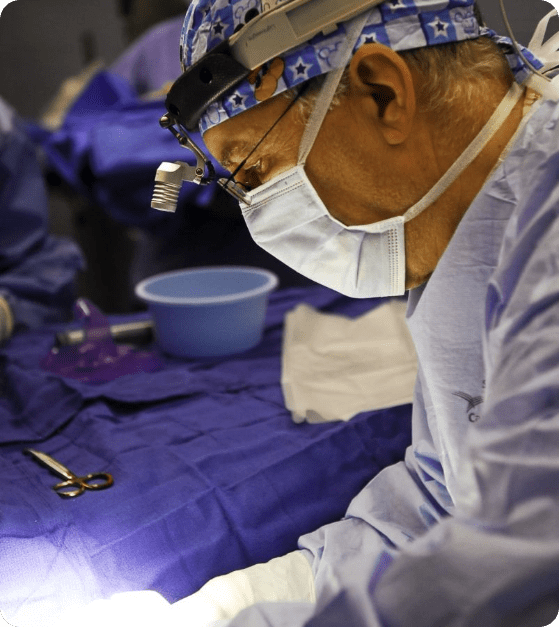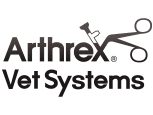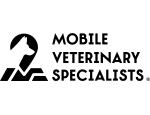ANIMAL OWNERS
What is a veterinary surgeon, and why does my animal need to see one?
Find a board-certified veterinary surgeon near you.

Veterinarians can specialize in veterinary surgery, similar to how human medical doctors can specialize in surgery.
If your animal develops a problem or injury requiring advanced care and procedures, your primary care veterinarian or emergency room veterinarian may refer you to an ACVS Diplomate, an ACVS board-certified veterinary surgeon.
The American College of Veterinary Surgeons (ACVS) is the AVMA-recognized veterinary specialty organization® for certification of veterinarians in large animal surgery and small animal surgery.
Veterinary specialties like veterinary surgery are recognized by the American Veterinary Medical Association’s (AVMA) American Board of Veterinary Specialties.
Learn more below why you, as an animal owner, should seek out an ACVS board-certified veterinary surgeon when your animal’s care requires surgery. When you are ready to reach out to an ACVS Diplomate, use the ACVS Find a Surgeon directory to find a surgeon in your area.
ACVS also invites you to review questions to ask a veterinary surgeon here.
What is a veterinary surgeon?
A veterinary surgeon is a veterinarian who completed additional training after veterinary school and was certified as a specialist in veterinary surgery by the American College of Veterinary Surgeons (ACVS). ACVS board-certified veterinary surgeons are often referred to as ACVS Diplomates and will have DACVS (Diplomate, American College of Veterinary Surgeons) after their names on their websites, business cards, letterhead, etc.
The DACVS credential indicates that the veterinary surgeon successfully completed ACVS’s rigorous certification requirements after veterinary school. The requirements include a minimum of a one-year internship followed by a three-year residency program that meets guidelines established by ACVS. Residents must also conduct research published in a scientific journal and pass rigorous board examinations.
Only board-certified veterinarians can call themselves surgical specialists or veterinary surgeons.
See the complete pathway to certification that your veterinary surgeon followed to become an ACVS Diplomate.
Your Animal’s Healthcare Team: You, your primary care veterinarian, and an ACVS Diplomate
All primary care veterinarians may perform surgery as part of their veterinary practice. However, if your animal develops a problem or injury requiring advanced care and procedures, your primary care veterinarian or emergency room veterinarian may refer you to an ACVS Diplomate (a board-certified veterinary surgeon). The primary care veterinarian, the ACVS Diplomate, and you work together before and after the surgery. This team approach ensures continuity of care and optimal outcomes for your animal.
Following surgery and any postoperative follow-up care, the primary veterinarian resumes ongoing care of the animal.
Why should I see a veterinary surgeon with my animal?
Animals deserve the very best care possible.
Just as humans are treated by specialists for a variety of medical reasons, animals should be treated by veterinary specialists when advanced care is warranted. Surgery is an example of advanced care. ACVS Diplomates are board-certified specialists in veterinary surgery.
There are a variety of reasons to seek a veterinary surgeon:
Expertise and specialized training:
- Primary care veterinarians focus on the day-to-day needs of your animal. Veterinary surgeons spend years training specifically in surgical procedures.
- Specialists are more likely to see complicated cases.
- Specialists can provide you with state-of-the-art options and help you determine the best treatment for your animal.
Enhanced care. Surgeons are more likely to have access to:
- Specialty equipment
- Other veterinary specialists (your surgical team may include board-certified radiologists, anesthesiologists, and internal medicine specialists)
- Technicians who understand the needs of animals undergoing surgery
- Postoperative monitoring of your pet














